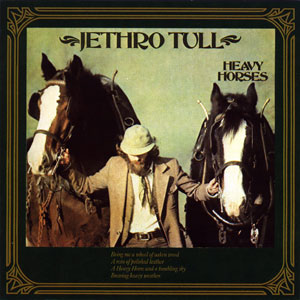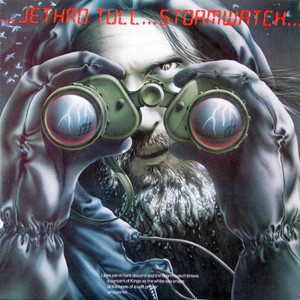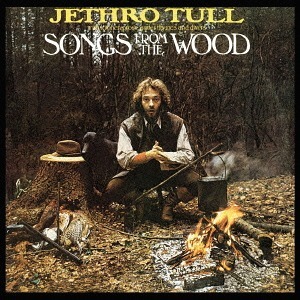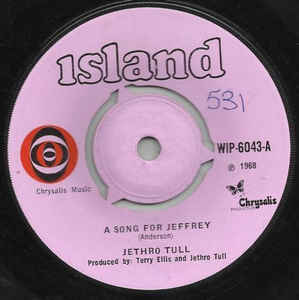Related Research Articles

Jethro Tull are a British rock band formed in Blackpool, Lancashire in 1967. Initially playing blues rock and jazz fusion, the band soon incorporated elements of English folk music, hard rock and classical music, forging a signature progressive rock sound. The group's founder, bandleader, principal composer, lead vocalist, and only constant member is Ian Anderson, a multi-instrumentalist who mainly plays flute and acoustic guitar. The group has featured a succession of musicians throughout the decades, including significant contributors such as guitarists Mick Abrahams and Martin Barre ; bassists Glenn Cornick, Jeffrey Hammond, John Glascock, Dave Pegg, Jonathan Noyce, and David Goodier; drummers Clive Bunker, Barrie "Barriemore" Barlow and Doane Perry; and keyboardists John Evan, Dee Palmer, Peter-John Vettese, Andrew Giddings, and John O'Hara.

Heavy Horses is the eleventh studio album by British progressive rock band Jethro Tull, released on 10 April 1978.

Roots to Branches is the 19th studio album by the British band Jethro Tull released in September 1995. It carries characteristics of Tull's classic 1970s progressive rock and folk rock roots alongside jazz and Arabic and Indian influences. All songs were written by Ian Anderson and recorded at his home studio. This is the last Tull album to feature Dave Pegg on the bass, and the first to feature keyboardist Andrew Giddings as an official band member, although he had contributed to Catfish Rising (1991) on a sessional basis. As a result, the album notably features the five longest serving members to date in Jethro Tull’s history. It was also the final Tull album to be released through long-time label Chrysalis Records.

Stormwatch is the twelfth studio album by progressive rock band Jethro Tull, released in September 1979. The album is often considered the last in a trio of folk rock albums released by the band at the end of the 1970s, alongside Songs from the Wood (1977) and Heavy Horses (1978). The album's themes deal mostly with the environment, climate and seaside living, and were heavily inspired by the Isle of Skye in Scotland, where frontman Ian Anderson had recently purchased property.

Benefit is the third studio album by the British rock band Jethro Tull, released in April 1970. It was the first Tull album to include pianist and organist John Evan – though he was not yet considered a permanent member of the group – and the last to include bass guitarist Glenn Cornick, who was fired from the band upon completion of touring for the album. It was recorded at Morgan Studios, the same studio where the band recorded its previous album Stand Up; however, they experimented with more advanced recording techniques.

Songs from the Wood is the tenth studio album by British progressive rock band Jethro Tull, released on 11 February 1977 by Chrysalis Records. The album is considered to be the first of three folk rock albums released by the band at the end of the 1970s, followed by Heavy Horses (1978) and Stormwatch (1979).

Martin Lancelot Barre is an English guitarist best known for his longtime role as lead guitarist of British rock band Jethro Tull, with whom he recorded and toured from 1968 until the band's initial dissolution in 2011. Barre played on all of Jethro Tull's studio albums from their 1969 album Stand Up to their 2003 album The Jethro Tull Christmas Album. In the early 1990s he began a solo career, and he has recorded several albums as well as touring with his own live band.

Bursting Out is a 1978 live double album by the rock band Jethro Tull. The album was recorded during the band's European Heavy Horses Tour in May/June of that year.

Crest of a Knave is the sixteenth studio album by British rock band Jethro Tull, released in 1987. The album was recorded after a three-year hiatus caused by a throat infection of vocalist Ian Anderson, resulting in his changed singing style. Following the unsuccessful electronic rock album Under Wraps, Crest of a Knave had the band returning to a more hard rock sound. The album was their most successful since the 1970s and the band enjoyed a resurgence on radio broadcasts, appearances in MTV specials and the airing of music videos. It was also a critical success, winning the 1989 Grammy Award for Best Hard Rock/Metal Performance Vocal or Instrumental in what was widely viewed as an upset over the favorite, Metallica's ...And Justice for All. The album was supported by "The Not Quite the World, More the Here and There Tour".
"Aqualung" is a song by the British progressive rock band Jethro Tull, and the title track from their Aqualung (1971) album. The song was written by the band's frontman, Ian Anderson, and his then-wife Jennie Franks.

"Locomotive Breath" is a song by British progressive rock band Jethro Tull from their 1971 album, Aqualung.
"Cross-Eyed Mary" is a song by the British progressive rock band Jethro Tull from their album Aqualung (1971).

"Living in the Past" is a song by British progressive rock group Jethro Tull. It is one of the band's best-known songs, and it is notable for being written in the unusual 5
4 time signature. The use of quintuple meter is quickly noted from the beginning rhythmic bass pattern, though it can also be explained as a distinct 6
8 + 2
4 syncopated rhythm.
Dee Palmer is an English composer, arranger, and keyboardist best known for having been a member of the progressive rock group Jethro Tull from 1976 to 1980.

Live at Madison Square Garden 1978 is a concert video and an album by British rock band Jethro Tull, released in 2009. It was recorded on 9 October 1978 at Madison Square Garden in New York City.

"A Song for Jeffrey" is a song recorded by the English rock band Jethro Tull, released as their second single in the UK, and as the B-side to "Love Story" in the US. The "Jeffrey" of the title is Ian Anderson's friend and future Jethro Tull bassist Jeffrey Hammond, who was "a slightly wayward lad who wasn’t quite sure where he was headed in life".

"Songs from the Wood" is the title track off of English rock band Jethro Tull's album Songs from the Wood. Written by frontman Ian Anderson, it features a folk-rock style that characterizes the Songs from the Wood album.

"Skating Away on the Thin Ice of the New Day" is a song by British progressive rock band Jethro Tull. It was released on their album War Child in 1974. Written as a comment on global cooling for the band's aborted "Chateau D'isaster" album, the song was reworked in 1974 for War Child.

"Too Old to Rock 'n' Roll: Too Young to Die" is a song by British progressive rock band Jethro Tull. Written by frontman Ian Anderson, it was released on their 1976 album of the same name. Written about an aging biker, the song title was inspired by a flight Anderson had taken in the United States.

The Zealot Gene is the 22nd studio album by the British rock band Jethro Tull, released on 28 January 2022 by Inside Out Music. Nearly five years in production, it is their first studio album since The Jethro Tull Christmas Album (2003), and their first of all original material since J-Tull Dot Com (1999), marking the longest gap between the band's studio albums.
References
- ↑ Murphy, Sean (22 May 2011). "The 25 Best Progressive Rock Songs of All Time". PopMatters . p. 2. Retrieved 29 March 2021.
- ↑ Blistein, Jon (27 March 2018). "Jethro Tull Detail Massive 50th Anniversary Compilation". Rolling Stone . Retrieved 29 March 2021.
- ↑ Parker, Gary (2018). Original Jethro Tull: The Glory Years, 1968-1980. United States: McFarlane & Company, Inc. p. 133. ISBN 978-1-4766-7434-6.
- 1 2 Nollen, Scott Allen (2002). Jethro Tull: A History of the Band, 1968-2001. London: McFarlane & Company, Inc. pp. 134–135. ISBN 0-7864-1101-5.
- 1 2 Dome, Malcolm (21 July 2015). "Ian Anderson's Top 10 Jethro Tull Songs". Classic Rock . Retrieved 13 February 2019.
- 1 2 Eder, Bruce. "Heavy Horses - Jethro Tull | Songs, Reviews, Credits". AllMusic . Retrieved 1 May 2015.
- ↑ Rehe, Christoph (2013). Rock - Das Gesamtwerk der größten Rock-Acts im Check: alle Alben, alle Songs. Ein eclipsed-Buch (in German). Sysyphus Sysyphus Verlags GmbH. ISBN 978-3868526462.
- ↑ Bowling, David (26 April 2011). "Music Review: Jethro Tull - Heavy Horses". Seattle Post-Intelligencer . Retrieved 3 October 2019.
- ↑ "Jethro Tull - Heavy Horses (1978) album review". Melody Maker . TullPress.com. 15 April 1978. Retrieved 1 May 2015.
- ↑ Moser, John J. (14 August 2017). "Review: Jethro Tull, Colston Hall". The Morning Call . Retrieved 3 October 2019.
- ↑ Chaiken, Mike (18 September 2019). "Review: One year past 50, Jethro Tull's music still shines under Anderson's baton". Republican-American . Retrieved 3 October 2019.
- ↑ Graff, Gary (2 July 2018). "Review: Jethro Tull sounds 50 years young at Michigan Lottery Amphitheatre". The Macomb Daily . Retrieved 3 October 2019.
- ↑ Cashmere, Paul (20 August 2019). "Jethro Tull co-founder Martin Barre to perform the music of Tull live in Australia". Noise11. Retrieved 3 October 2019.